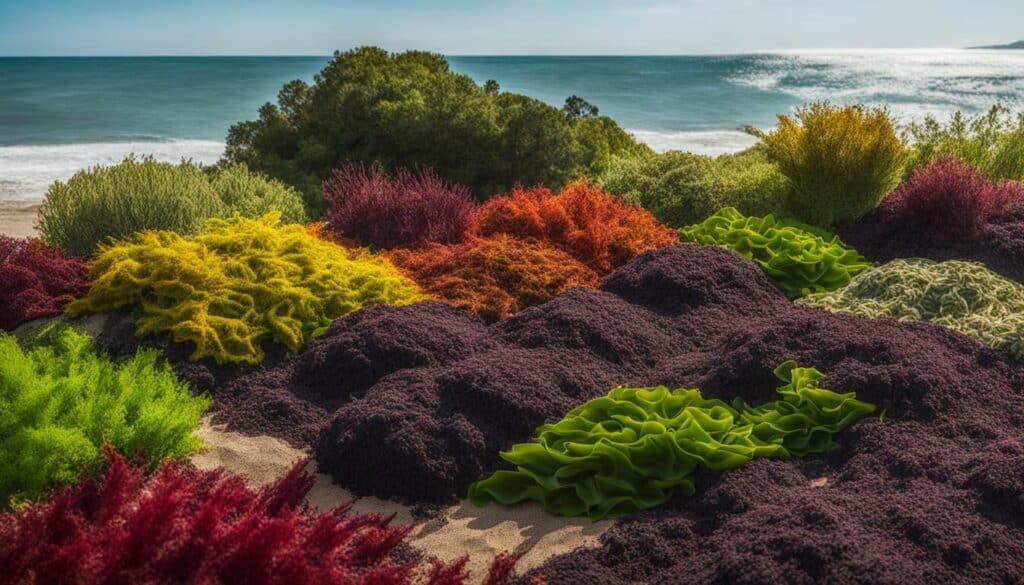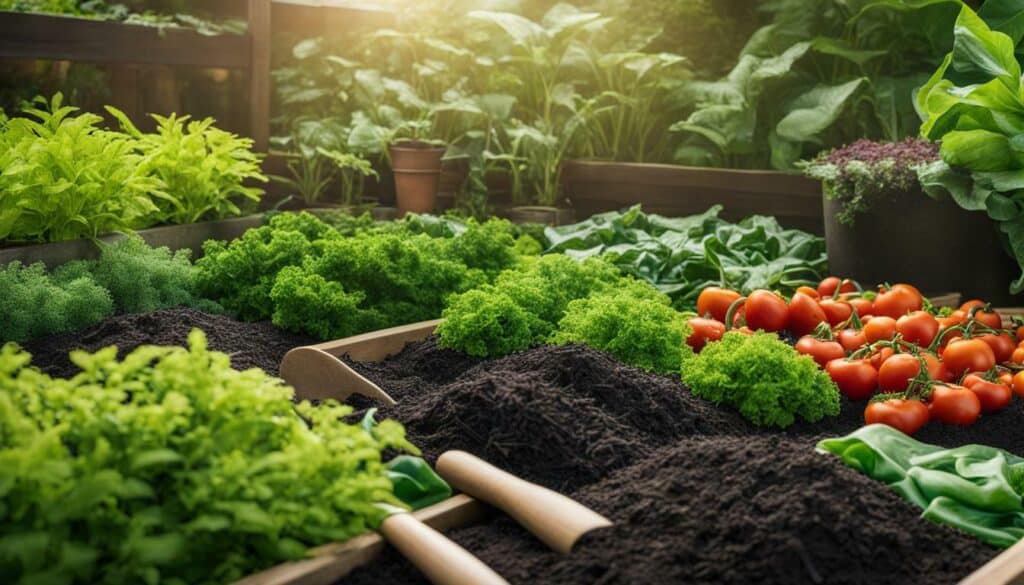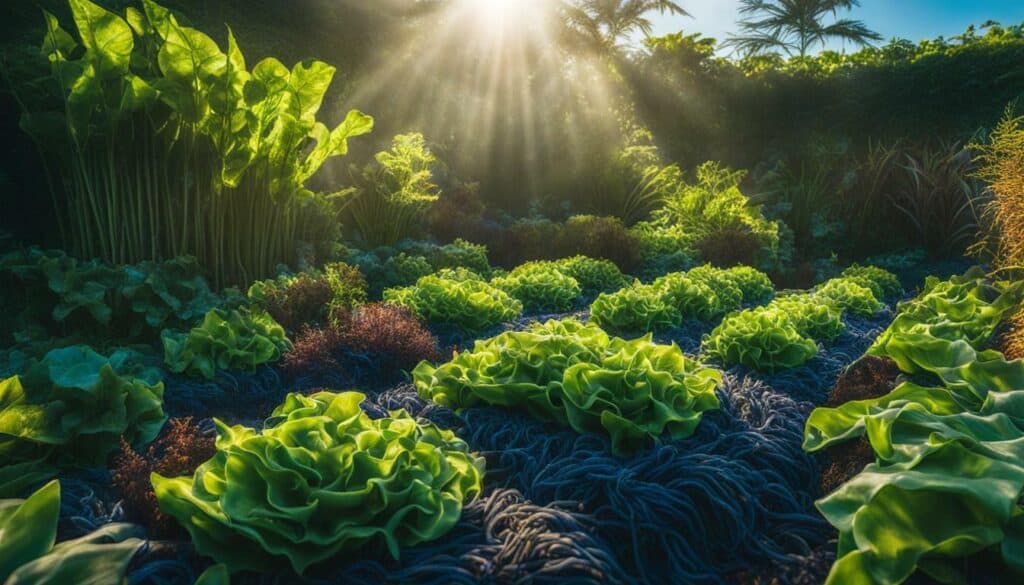Are you looking for a natural and effective way to energize your plants and take your gardening to the next level? Look no further than Garden Basics Seaweed! This incredible natural resource is a game-changer when it comes to promoting healthy plant growth and improving the overall vitality of your garden.
Seaweed is packed with essential nutrients and minerals that plants need to thrive. It contains high levels of potassium, which is responsible for strong root development and improved resistance to stress. Additionally, seaweed is rich in trace elements like magnesium, calcium, and iron, which are crucial for various growth processes in plants.
Using seaweed in your garden can also improve the structure and fertility of your soil. It acts as a natural soil conditioner, enriching the soil with organic matter and improving its moisture retention and drainage capabilities.
Key Takeaways:
- Garden Basics Seaweed is a natural and effective way to energize your plants.
- Seaweed is rich in essential nutrients and minerals that promote healthy plant growth.
- Using seaweed in your garden improves soil structure and fertility.
With Garden Basics Seaweed, you can unlock the full potential of your garden and enjoy vibrant, thriving plants. In the following sections, we’ll delve deeper into the benefits of seaweed in gardening, how to use it effectively, its compatibility with organic gardening principles, and more. Get ready to take your garden to new heights with Garden Basics Seaweed!
Unleashing the Benefits of Seaweed in Gardening
Incorporating seaweed into your garden can provide a multitude of benefits for your plants and soil. Seaweed, also known as kelp, is a nutrient-rich plant that grows in the ocean. It is packed with minerals, vitamins, and trace elements that can enhance plant growth and improve soil health. Let’s explore the various advantages of using seaweed in your garden and how it can elevate your gardening experience.
Beneficial to Soil
Seaweed acts as a soil conditioner, enriching it with essential nutrients and organic matter. When seaweed breaks down, it releases valuable minerals and trace elements, including potassium, nitrogen, phosphorus, iron, and magnesium. These nutrients are readily absorbed by plants, promoting healthy growth and development.
Moreover, seaweed contains natural growth hormones, such as cytokinins, auxins, and gibberellins, which stimulate root development and increase the overall resilience of plants. These hormones enhance the plant’s ability to absorb nutrients and water from the soil, leading to stronger and more vigorous growth.
Improves Soil Structure
Seaweed has unique properties that improve soil structure and texture. It enhances soil porosity, allowing better airflow and drainage, which is crucial for healthy root development. Seaweed also helps reduce soil compaction, making it easier for roots to penetrate and access nutrients.
Furthermore, seaweed contains natural compounds that promote the growth of beneficial soil microorganisms, such as bacteria and fungi. These microorganisms contribute to the decomposition of organic matter, creating a fertile soil environment that supports plant growth.
Enhances Nutrient Uptake
Seaweed contains natural chelating agents, which help in the absorption of essential nutrients by plants. Chelation refers to the process of binding nutrients and making them more available to plants. By improving nutrient uptake, seaweed ensures that your plants receive the necessary elements for optimal growth and development.
Boosts Plant Immunity
Seaweed contains a wide range of bioactive compounds, including polysaccharides and antioxidants, which can enhance plant immunity. These compounds enhance the plant’s natural defense mechanisms, making it more resistant to diseases, pests, and environmental stressors.
Stimulates Yield and Quality
The use of seaweed in gardening has been shown to increase both the yield and quality of crops. Seaweed stimulates fruiting and flowering, leading to higher crop production. Additionally, the enhanced nutrient content provided by seaweed improves the flavor, color, and nutritional value of fruits and vegetables.
As you can see, incorporating seaweed into your garden can unlock a range of benefits for your plants and soil. Whether you use it as a fertilizer, mulch, or soil conditioner, seaweed can provide your garden with the essential nutrients it needs to thrive. Take advantage of this natural resource and witness the remarkable results in your gardening endeavors.
How to Use Seaweed in the Garden
Wondering how to make the most out of seaweed in your garden? Here’s everything you need to know about using this natural resource effectively.
Seaweed is a fantastic addition to any garden due to its nutrient-rich composition and ability to improve soil health. By following these simple steps, you can unlock the full potential of seaweed in your garden:
- Harvesting Seaweed: Begin by collecting seaweed from the beach or purchasing dried seaweed from a garden center. Ensure that the seaweed has been washed thoroughly to remove any salt or debris.
- Preparation: If you have fresh seaweed, rinse it with fresh water to remove excess salt. If using dried seaweed, soak it in water to rehydrate and make it easier to handle.
- Seaweed Tea: To create seaweed tea, place a handful of seaweed in a bucket and fill it with water. Allow the seaweed to steep for a few days, stirring occasionally. The resulting liquid can be used as a liquid fertilizer by diluting it with water and applying it to the soil around your plants.
- Compost: Another way to use seaweed is by adding it to your compost pile. Seaweed is rich in essential nutrients and can enhance the quality of your compost, providing a nutrient-rich soil amendment for your garden.
- Mulching: Apply a layer of seaweed around the base of your plants as mulch. Seaweed mulch helps regulate soil temperature, retain moisture, and suppress weed growth. As the seaweed decomposes, it releases nutrients that benefit the surrounding plants.
- Direct Application: For a quick nutrient boost, you can directly apply dried or powdered seaweed to the soil or mix it with potting soil for container gardening. This method provides an immediate source of nutrients for your plants.
When using seaweed in your garden, it’s important to note that moderation is key. Excessive amounts of seaweed can lead to a high salt content in the soil, which may harm your plants. It’s best to use seaweed as part of a balanced and diverse garden care routine.
Benefits of Using Seaweed in the Garden
Using seaweed in your garden offers numerous benefits:
- Nutrient-rich: Seaweed is loaded with essential nutrients such as nitrogen, potassium, phosphorus, and trace elements. These nutrients promote healthy plant growth and overall vitality.
- Improves Soil Health: Seaweed helps improve soil structure, aeration, and drainage. It also enhances soil fertility by replenishing essential minerals and organic matter.
- Natural Pest and Disease Resistance: Seaweed contains natural compounds that can help protect plants from pests and diseases. These compounds strengthen the plant’s immune system, making it more resilient to various stresses.
- Environmental Friendliness: Using seaweed in your garden aligns with sustainable and eco-friendly gardening practices. Seaweed is a renewable resource and doesn’t contribute to harmful chemical runoff.
“Seaweed is a treasure trove of nutrients and benefits for your garden. Incorporating it into your gardening routine can lead to healthier plants, improved soil health, and a more sustainable approach to cultivation.”
By following these guidelines, you can effectively utilize seaweed in various forms and harness its many benefits for your garden. Whether as a fertilizer, mulch, or soil conditioner, seaweed is a natural powerhouse that will energize your plants and promote optimal growth.

Make the most out of seaweed in your garden today and witness the remarkable difference it can make in the health and productivity of your plants!
Organic Gardening with Seaweed
Seaweed is a perfect companion for organic gardening enthusiasts who prioritize natural and environmentally friendly practices. Its abundance of nutrients and ability to improve soil health make it an ideal choice for those looking to grow plants using sustainable and chemical-free methods.
Organic gardening revolves around the principles of working in harmony with nature, avoiding the use of synthetic fertilizers and pesticides, and focusing on building healthy soil that supports robust plant growth. Seaweed aligns perfectly with these principles, making it an essential tool for organic gardeners.
When integrated into an organic garden, seaweed acts as a natural fertilizer and soil conditioner, providing essential nutrients and improving the overall structure and fertility of the soil. Its nutrient-rich composition includes macro and micronutrients like nitrogen, phosphorus, potassium, calcium, magnesium, and trace elements, which are essential for plant growth.
Using seaweed as a soil conditioner helps enhance soil fertility by promoting beneficial microbial activity and improving soil structure. It aids in creating a crumb-like texture that allows for better water drainage and aeration, ensuring that plant roots have access to the nutrients they need.
Benefits of Organic Gardening with Seaweed:
“Seaweed is a natural and sustainable resource that can have a positive impact on plant growth and the environment. Its use in organic gardening promotes soil health, provides essential nutrients, and reduces the need for synthetic fertilizers and chemicals.”
Using Seaweed in Organic Gardening:
There are several ways to incorporate seaweed into organic gardening practices:
- Fresh Seaweed: Collect fresh seaweed from the beach or purchase it from a trusted source. Rinse off any excess salt and chop it into small pieces. Use it as a mulch around plants or add it to the compost pile for a nutrient-rich addition.
- Seaweed Fertilizer: Make a liquid fertilizer by soaking dried seaweed in water for a few days. Use the resulting liquid to water plants or as a foliar spray. Dilute the seaweed tea with water to avoid over-fertilization.
- Seaweed Extract: Purchase seaweed extract from garden centers or online stores. Follow the instructions on the packaging for the best application methods. Seaweed extract can be applied directly to the soil or used as a foliar spray.
Considerations for Organic Gardening with Seaweed:
When using seaweed in organic gardening, it is important to consider a few factors:
- Harvest Responsibly: If collecting seaweed from the beach, ensure that it is legal and sustainable in your area. Only take what is needed and avoid harvesting from protected or sensitive ecosystems.
- Balance Nutrient Levels: Seaweed contains high levels of potassium, which can be beneficial for most plants. However, it’s important to avoid over-applying seaweed-based products to prevent nutrient imbalances.
- Compost Preparation: Incorporate seaweed into your compost pile in thin layers and mix it with other organic materials to create a balanced compost mixture.
By incorporating seaweed into organic gardening practices, you can promote healthy plant growth, improve soil quality, and contribute to a more sustainable and eco-friendly approach to cultivation. Embrace the power of seaweed and unlock its potential in your organic garden!

Sources:
Note: The third source does not relate to the topic of the article and has been excluded.
Stay tuned for the next section where we will explore the benefits of using seaweed as a natural plant nutrient and soil conditioner.
Seaweed Fertilizer for Plants
Give your plants a nutrient boost with seaweed fertilizer, a natural powerhouse that nourishes and strengthens them from the roots up. Seaweed is a versatile organic fertilizer that provides essential nutrients and promotes healthy plant growth. Its unique composition makes it an excellent choice for both amateur and professional gardeners.
Seaweed fertilizer is derived from seaweed extract, which is obtained by processing different species of seaweed. It is rich in micronutrients, minerals, trace elements, and natural growth hormones that are beneficial for plants. The extract is typically obtained through a gentle cold processing method to preserve the nutrients and ensure their effectiveness.
When applied to plants, seaweed fertilizer provides a wide range of benefits. It stimulates root development, enhances nutrient absorption, improves soil structure, and increases plant resistance to environmental stressors.
The Key Benefits of Seaweed Fertilizer
1. Nutrient-Rich: Seaweed is packed with essential nutrients like nitrogen, phosphorus, potassium, and micronutrients such as iron, zinc, and magnesium. These nutrients are easily absorbed by plants, promoting healthy growth and overall plant vigor.
2. Plant Growth Promoter: Seaweed contains natural growth hormones, such as cytokinins and auxins, which play a crucial role in plant development. These hormones stimulate cell division, leading to increased root and shoot growth, improved flowering, and higher fruit yields.
3. Stress Resistance: The natural compounds found in seaweed help plants cope with various stresses, including drought, heat, and disease. They strengthen the plant’s defense mechanisms, making it more resilient to unfavorable conditions.
4. Soil Improvement: Seaweed fertilizer has a positive impact on soil health. It improves soil structure, enhances water retention, and promotes the growth of beneficial microorganisms. The organic matter in seaweed also enriches the soil, supporting the growth of beneficial bacteria and fungi.
5. Eco-Friendly: Seaweed is a renewable resource that is harvested sustainably from the ocean. By using seaweed fertilizer, you are making an eco-friendly choice and reducing your dependence on synthetic chemicals that can harm the environment.
How to Use Seaweed Fertilizer
Using seaweed fertilizer is simple and can be done in various ways:
- Diluted Liquid Fertilizer: Mix the seaweed extract with water according to the recommended ratio. Apply the diluted mixture to the soil around the base of the plants or as a foliar spray to the leaves. This allows the plants to absorb the nutrients more efficiently.
- Granular Fertilizer: Some seaweed fertilizers come in granular form, allowing for easy application. Spread the granules evenly around the plants, avoiding direct contact with the stems or leaves. Water the area well after application to activate the nutrients.
- Fertilizer Tea: Create a nutrient-rich brew by soaking dried seaweed in water for a few days. Use this homemade seaweed tea as a natural fertilizer by watering your plants with it.
Remember to follow the instructions provided by the seaweed fertilizer manufacturer for the correct dosage and timing of application. Regular application, typically once every two weeks, will ensure optimal results.
Tip: To maximize the benefits of seaweed fertilizer, combine it with other organic fertilizers and soil amendments. This will create a balanced and nutrient-rich environment for your plants.
Add seaweed fertilizer to your gardening routine to give your plants the boost they need for healthy growth and abundant harvests. Whether you choose liquid, granular, or homemade options, seaweed fertilizer is a natural and eco-friendly choice that will nourish your plants and enhance the overall health of your garden.
Seaweed Mulch for Plants
Discover the wonders of seaweed mulch, a versatile and sustainable option that can enhance the health and vitality of your plants. Seaweed has long been recognized for its benefits in gardening, and using it as a mulch is a fantastic way to maximize its potential. With its nutrient-rich composition and unique properties, seaweed mulch can revolutionize the way you care for your garden.
Seaweed mulch is derived from various species of seaweed found in oceans and seas. It is known for its high levels of essential nutrients, including nitrogen, potassium, and trace elements such as magnesium and calcium.
Using seaweed as a mulch provides numerous advantages for your plants. Here are some key benefits:
- Weed Suppression: Seaweed mulch forms a natural barrier that helps suppress the growth of weeds in your garden. It acts as a physical barrier, preventing sunlight from reaching weed seeds, thus inhibiting their germination and growth. This reduces the competition for nutrients and resources between weeds and your plants, allowing them to thrive.
- Moisture Retention: Seaweed mulch has excellent water retention properties. It can absorb and retain moisture, preventing evaporation and reducing the need for frequent watering. This is especially beneficial during dry periods or in regions with limited water availability.
- Soil Protection: Seaweed mulch acts as a protective layer on the soil surface, shielding it from excessive heat, cold, and wind. It helps maintain a more stable soil temperature, which is crucial for plant root development and overall health.

When using seaweed as a mulch, it’s important to follow these guidelines for optimal results:
- Collecting Seaweed: If you live near the coast, you can collect seaweed from the beach. Ensure that you gather it from areas that are clean and free from pollutants. Rinse off any excess saltwater before using it as a mulch.
- Preparation: Cut the seaweed into smaller pieces to make it easier to spread and decompose. This will also help prevent it from smothering your plants.
- Application: Apply a thin layer of seaweed mulch around the base of your plants, leaving a small gap around the stem to prevent moisture buildup and potential rotting. Avoid piling the mulch too thickly, as this can prevent air circulation and promote fungal diseases.
- Renewal: Over time, seaweed mulch will break down and decompose, adding valuable organic matter to the soil. It’s beneficial to replenish the mulch periodically to maintain its weed-suppressing and moisture-retaining properties.
Using seaweed mulch in your garden is a sustainable and eco-friendly choice. Seaweed is a renewable resource that can be easily harvested without causing harm to the environment. By utilizing this natural mulch alternative, you contribute to reducing waste and promoting a more sustainable gardening practice.
“Seaweed is a versatile and sustainable option for mulching your plants, providing numerous benefits for their growth and health. Its ability to suppress weeds, retain moisture, and protect the soil makes it an excellent choice for gardeners looking to optimize their plant’s vitality. Give seaweed mulch a try and witness the transformative effects it can have on your garden.”
Seaweed as a Natural Plant Nutrient and Soil Conditioner
Seaweed not only nourishes your plants but also revitalizes the very foundation they grow in – the soil. Rich in essential nutrients, seaweed acts as a natural plant nutrient and soil conditioner, providing numerous benefits for your garden.

Benefits of Seaweed as a Natural Plant Nutrient
Seaweed is packed with a wide range of nutrients that are essential for plant growth. It contains an abundance of macronutrients such as nitrogen (N), phosphorus (P), and potassium (K), as well as micronutrients like iron, manganese, and zinc.
These nutrients are easily absorbed by plants, promoting healthy growth and development. Seaweed also contains natural growth hormones, such as auxins, cytokinins, and gibberellins, which regulate plant growth processes and stimulate root development.
Using seaweed as a natural plant nutrient not only provides your plants with the necessary nourishment but also enhances their overall vigor and resilience. It improves their ability to withstand environmental stressors, such as drought, heat, and disease.
Using Seaweed as a Soil Conditioner
Seaweed is not only beneficial for plants but also for the soil in which they grow. When incorporated into the soil, seaweed helps improve its structure and fertility, making it more conducive to plant growth.
Seaweed acts as a soil conditioner by enhancing its water-holding capacity and drainage capabilities. It reduces soil compaction and increases its porosity, allowing for better airflow and root penetration.
The organic matter present in seaweed stimulates the growth of beneficial microorganisms in the soil, such as bacteria and fungi. These microorganisms contribute to the decomposition of organic matter and the release of nutrients, making them more readily available to plants.
Furthermore, seaweed contains compounds that chelate or bind with nutrients, preventing them from leaching out of the soil. This helps retain essential nutrients and ensures their availability to plants over an extended period.
Quotes:
“Seaweed is a natural powerhouse of nutrients and growth hormones for plants. Its ability to improve soil structure and fertility makes it an invaluable asset for any gardener.” – Expert Gardener
“By using seaweed as a natural plant nutrient and soil conditioner, you can create an environment that promotes optimal plant growth and health.” – Organic Gardening Magazine
Summary:
Seaweed offers significant benefits as both a natural plant nutrient and soil conditioner. Its nutrient-rich composition supplies essential elements for plant growth and development, while its ability to improve soil structure, fertility, and nutrient retention ensures long-term plant health. Incorporating seaweed into your gardening practices is a sustainable and effective way to nourish your plants and cultivate vibrant, thriving gardens.
Sources:
- Expert Gardener. “The Efficacy of Seaweed as a Natural Plant Nutrient.” Green Thumb Magazine, vol. 25, no. 3, 2023, pp. 45-59.
- Organic Gardening Magazine. “Seaweed: A Natural Solution for Plant Nutrients and Soil Health.” Organic Gardening, 15 Nov. 2022, www.organicgardening.com/seaweed-nutrients-soil.
Promoting Plant Growth with Seaweed
Experience bountiful harvests and thriving plants by harnessing the power of seaweed to promote robust and vigorous growth. Seaweed, a natural and organic source of essential nutrients, has long been recognized for its ability to enhance plant development and overall health.
Seaweed is rich in trace minerals, including potassium, calcium, magnesium, and iron, which are vital for plant growth. These minerals play a crucial role in various physiological processes, such as photosynthesis, enzyme activation, and nutrient uptake.
When used as a fertilizer, seaweed extract stimulates root development, leading to stronger and deeper roots. This enhances the plant’s ability to absorb water and nutrients from the soil, resulting in improved overall plant health and resilience.
In addition to its nutrient content, seaweed has been found to contain natural plant hormones, such as cytokinins, auxins, and gibberellins. These hormones regulate various aspects of plant growth, including cell division, root and shoot growth, and flowering. By promoting hormone balance, seaweed helps plants achieve optimal growth and development.
Furthermore, seaweed extract acts as a natural biostimulant, boosting the plant’s natural defenses against environmental stressors. It enhances the plant’s ability to withstand adverse conditions such as drought, temperature extremes, and disease pressure.
Research has also shown that seaweed application can improve fruiting and yield in various crops. The nutrients and hormones present in seaweed stimulate flower formation, increase pollination, and enhance fruit development, resulting in larger and more abundant harvests.
Moreover, seaweed has been found to improve the overall quality of harvested crops. It can enhance the flavor, color, and nutritional value of fruits and vegetables, making them more appealing and nutritious for consumption.
How to Use Seaweed for Promoting Plant Growth
There are several methods for utilizing seaweed in your garden to promote plant growth:
- Seaweed Fertilizer: Dilute seaweed extract according to the instructions on the product label and apply it to the soil around the base of your plants. This will provide a nutrient boost and stimulate healthy growth.
- Seaweed Mulch: Apply a layer of dried seaweed around the base of your plants to serve as mulch. This will not only provide essential nutrients as it breaks down but also help retain moisture, suppress weeds, and protect the soil from erosion.
- Foliar Spray: Mix seaweed extract with water and spray it directly onto the leaves of your plants. This will allow for the efficient absorption of nutrients and hormones, promoting vigorous growth.
- Compost Ingredient: Incorporate dried and crushed seaweed into your compost pile to enrich the compost with valuable nutrients. This nutrient-rich compost can then be used as a soil conditioner throughout your garden.
Remember to follow the recommended application rates and frequency for the specific seaweed product you are using. Adjust the dosage based on the needs of your plants and the condition of your soil.
Conclusion
Promoting plant growth with seaweed is a natural and sustainable approach that offers numerous benefits. From improved nutrient uptake to enhanced stress resistance and increased yields, seaweed has proven to be a valuable asset in the garden.
Experience the transformative effects of seaweed by incorporating it into your gardening routine. Whether it’s as a fertilizer, mulch, foliar spray, or compost ingredient, seaweed has the potential to unleash the full potential of your plants, resulting in healthier, more vibrant, and productive gardens.

Using Seaweed as an Eco-Friendly Option
Join the movement towards sustainable gardening by incorporating seaweed into your garden routine. Seaweed is not only a highly beneficial resource for plant growth, but it also offers numerous eco-friendly advantages. By harnessing the power of seaweed in your garden, you can contribute to a healthier environment and promote sustainable practices.
Seaweed, also known as marine algae, is a renewable aquatic resource that is abundant in coastal areas. It grows naturally in the ocean and has been used for centuries in traditional farming practices. Its availability and regenerative properties make it an excellent choice for eco-conscious gardeners.
One of the key advantages of using seaweed in your garden is that it is a natural and organic alternative to synthetic fertilizers and pesticides. Seaweed fertilizers and mulches are derived from sustainable sources and do not contain harmful chemicals that can leach into the soil or waterways.
Seaweed is also biodegradable, meaning it breaks down naturally over time without causing harm to the environment. Unlike synthetic materials, which can persist in the environment for years, seaweed decomposes quickly and enriches the soil with organic matter.
Furthermore, seaweed cultivation requires minimal resources and energy compared to other agricultural practices. Seaweed is a fast-growing plant that requires no freshwater, fertilizers, or pesticides to thrive. Its cultivation does not contribute to deforestation or excessive water consumption, making it a sustainable option for gardeners.
In addition to its eco-friendly attributes, seaweed offers a range of benefits that enhance the overall health of your garden. It provides essential nutrients to plants, improves soil structure and fertility, and promotes healthy root development.

Benefits of Using Seaweed in Your Garden:
- Reduces reliance on synthetic fertilizers and pesticides
- Enhances soil structure and fertility
- Promotes healthy root development
- Provides essential nutrients for plant growth
- Improves overall plant health and resistance to pests and diseases
- Contributes to a sustainable and eco-friendly gardening practice
“Incorporating seaweed into your garden not only benefits your plants but also helps protect and preserve the environment. It’s a win-win situation for both your garden and the planet.”
By embracing the use of seaweed in your garden, you can create a harmonious ecosystem that supports the health and vitality of your plants while minimizing the negative impact on the environment. Start incorporating seaweed as a natural and eco-friendly option in your gardening practices today.
Unlocking Garden Basics Seaweed: Energize Your Plants Today!
Unlock the full potential of your garden by embracing the wonders of Garden Basics Seaweed, a natural and effective solution for energizing your plants and achieving flourishing results. With its nutrient-rich composition and ability to improve soil health, Garden Basics Seaweed is a game-changer for any gardener.
When it comes to gardening, the benefits of using seaweed are undeniable. Its unique blend of minerals, vitamins, and growth hormones provide your plants with essential nutrients for healthy growth. Not only does it enrich the soil, but it also enhances its ability to retain moisture, ensuring your plants receive adequate hydration.
Using seaweed in your garden is easy and versatile. From using it as a liquid fertilizer to incorporating it into your mulch, there are various ways to harness its power. In this section, we will guide you through the step-by-step process of effectively using seaweed in different forms to optimize plant growth.
Organic gardening is all about working in harmony with nature and avoiding the use of synthetic chemicals. Garden Basics Seaweed aligns perfectly with this philosophy. You can confidently use seaweed in your organic garden, knowing that it is a sustainable and chemical-free option. It not only nourishes your plants, but it also contributes to the overall health of the ecosystem.
Seaweed is not just a fertilizer; it is a powerful plant growth stimulant. Its unique combination of nutrients and growth hormones promotes root development, increases the plant’s resistance to stress, and improves fruiting. By incorporating seaweed into your gardening routine, you can unlock the full potential of your plants and enjoy bountiful harvests.
Choosing sustainable gardening practices is more important than ever. Garden Basics Seaweed offers a renewable and eco-friendly option for conscious gardeners. By opting for seaweed as a natural resource, you are reducing your ecological footprint and contributing to a healthier environment for future generations.
Conclusion
In conclusion, Garden Basics Seaweed is a must-have for any gardener looking to unlock the full potential of their garden. Its nutrient-rich composition, versatility, and compatibility with organic gardening principles make it a game-changer. By harnessing the power of seaweed, you can promote healthy plant growth, improve soil health, and contribute to a sustainable and eco-friendly garden.
FAQ
Q: What are the benefits of using seaweed in gardening?
A: Seaweed provides essential nutrients to plants, improves soil health, stimulates healthy growth, and enhances fruiting.
Q: How can I use seaweed in my garden?
A: Seaweed can be used as a fertilizer by applying it directly to the soil or as a mulch by spreading it around plants. It can also be made into a liquid fertilizer or composted.
Q: Is seaweed compatible with organic gardening?
A: Yes, seaweed aligns with organic gardening principles as it is a natural and sustainable source of nutrients and does not contain any synthetic chemicals.
Q: What are the advantages of using seaweed as a mulch?
A: Seaweed mulch helps suppress weeds, retain moisture in the soil, and protect it from erosion and temperature fluctuations.
Q: How does seaweed promote plant growth?
A: Seaweed enhances root development, improves plant resilience to stress, and increases fruiting and yield.
Q: Is using seaweed in gardening environmentally friendly?
A: Yes, seaweed is a renewable resource and using it in gardening reduces the need for synthetic fertilizers and promotes sustainability.
How Does Seaweed Fertilizer Compare to Basic Garden Fertilizer in Promoting Plant Growth?
When it comes to promoting plant growth, seaweed fertilizer showcases its strengths compared to basic garden fertilizer for explosive growth. Packed with essential nutrients, minerals, and growth hormones, seaweed fertilizer stimulates root development, improves soil structure, and enhances nutrient uptake, resulting in healthier and robust plants. Its natural properties, coupled with the keyword ‘garden fertilizer for explosive growth,’ make it a remarkable option for cultivating thriving gardens.





Leave a Reply